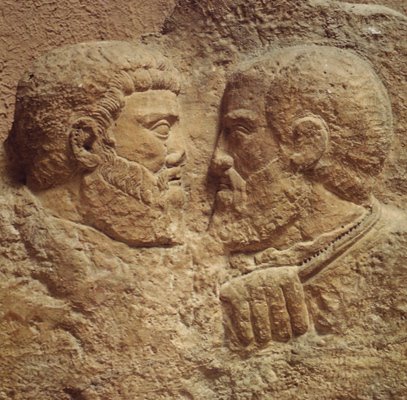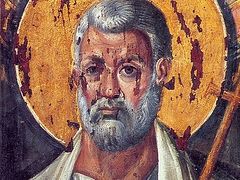In the Name of the Father and of the Son and of the Holy Spirit. Amen. Today the Church sets before us the Feast of Saints Peter and Paul: the two mighty pillars of the Church; St. Peter, the Apostle to the Jewish Nation, and St. Paul, the Apostle to the Gentiles. When we venerate the icon for this feast, we often see Peter and Paul embracing one another in fraternal (brotherly) love. They both certainly were different people with different temperaments. They both ministered to two mutually opposed groups of people (the Jews and the Gentiles, i.e., the rest of the world.) And they both certainly had their differences, recalling when, to use St. Paul’s words, he (Paul) at one time even withstood (or opposed) Peter to his face, for he was to be blamed (Galatians 2:11.)
In spite of this apparent tension, however, we see today within this feast an example of how we are to live with each other in the Church. Certainly, as people from all walks of life, we will have differences. We are all different people with different needs. However, today’s feast shows us that the Church is first and foremost a place where God’s love reigns (as the Lord said, the world will know us by the love we have one for another.) It is this love from God that enables us to overcome our interpersonal difficulties and it is this love that reminds us that with God all things are possible, and hence, when Christ commands us to “love our enemies” it is with the full knowledge that it is His love and grace that will empower us to do so. God doesn’t ask us to “like” our neighbors and enemies, He commands us to “love” our neighbors and our enemies, a task which is far greater and is not predicated on how we feel but it is a choice: it is a conscious decision on our part to will the highest good for everyone we come into contact with. Love is therefore a choice. It is how we choose to act/respond.
The great Saints Peter and Paul exemplify to us that even if we are different and even if we have disagreements, we can still live and work together in the Church and we can find reconciliation one to another through God’s grace and love, that is, if we are willing. Often times the only thing that stands in the way of us being truly reconciled one to another is a conscious choice to be humble and to say with heartfelt meaning to those who offend us the two words that literally BURN the devil: “Forgive me.”
Today’s feast also reminds us that we cannot live our Christian life alone. Peter was one arm of the Body of Christ and Paul the other, both of which the Lord used to build a foundation which stands rock solid to this very day. They were like the Sun and the Moon, providing the light for the Church day by day, for almost two millennia. Enough can not be said concerning the two greatest Apostles that the Church and the world has ever known. And yet, they both had been exceedingly humbled by circumstances in their lives and thereby also became two great examples of repentance.
St. Peter denied the Lord not once, but three times. The Church has always considered apostasy and denial of our Savior Jesus Christ to be an offense of incalculable magnitude. However, Peter by his sincere repentance, was re-instated after the Lord’s Resurrection and was empowered with the Holy Spirit. The once fearful disciple became a Light to the world and even died for his faith around the year 67 A.D.
We recall that St. Paul persecuted and even killed Christians before he received His call from on high, when he saw the Lord in the blinding light that darkened his eyes but enlightened his soul. Both of these teachers and luminaries had two essential wings by which they flew to heaven: the first, the life giving repentance for their past sins. And second, the
real contact they had with the Savior and Lord Jesus Christ which gave them a life giving faith in His True Divinity.
The great Elder, Fr. Sophrony of Essex, explains to us that real “Life giving faith consists in an unquestioning belief in Christ as God. Only when Christ is accepted as perfect God and perfect Man does the plentitude of spiritual experience described by the Apostles and Fathers become possible. Christ, having linked God and man inseparably in Himself, is the one and only solution of the apparently insoluble conflict [of evil in the world]. He is in truth the Savior of the world (John 4.42.) He is the sole way to the Father. He is the sun which illumines the universe. Only in His light can the way be seen.” (His Life is Mine, pg. 50.)
In the Gospel today (Matthew 16), the Lord asks Peter, Whom do you say that I am?” Peter answers Him, Thou art THE Christ, the Son of the Living God. The Lord then responds to him, Flesh and blood has not revealed this to you but rather my Father who is in Heaven. It is God Himself who must reveal the Truth to us. We cannot rationalize our way into the Truth about God. Thinking about the truth will often times result in speculations, each person coming up with varying and different conclusions. (For example, if I have to speculate about what is being said in a conversation in the back of this Church building during this sermon, I have no real way of knowing what is really being said. Someone would have to reveal the truth of the matter to me.) Likewise, heavenly, divine things which the eye has not seen nor the ear ever heard nor have never entered into the heart of man (1 Cor. 2) must be revealed by the Holy Spirit Who has always abode in Heaven with the Father and the Son. It cannot be otherwise.
However, it is this life giving faith in the truth of the Gospel message, that the Lord Jesus Christ is God from God, the Eternal Word of God in the flesh, it is this truth that not only brought St. Peter and St. Paul to repentance but also turned them into luminous stars for the universe and teachers for all the nations of the world. It is this faith that Christ is God that has immortalized and engraved their names and lives on the sands of time forever. “With what beauties of song then shall we hymn Peter and Paul? They are the wings of divine knowledge who soared above the ends of the earth and were upborne to the heavens, they are the hands of the grace of the Gospel, the rivers of wisdom, the arms of the Cross... they are the dreadful swords of the Spirit, the splendid adornments of Rome, the nurturers of the whole world, the noetic and divinely graven tablets of the new covenant, whom Christ, Who hath great mercy, proclaimed in Sion.” (Lord I Call Stichera, Vesperal Hymns) “We magnify you, O apostles of Christ, who enlightened the whole world with your teachings, and led all the ends of the earth unto Christ.” (Magnification, Matins.) Wherefore, beseech Him, O Apostles, in our behalf that our souls may find grace and mercy here and in the world to come. Let us therefore all strive to imitate their repentance and also their life giving faith, which will enable us to conquer the world as well. May we see in their relationship our own reconciliation with one another in the Church: knowing that it is always possible through Gods grace to walk hand in hand even if we don’t always see eye to eye, so that united by the love of God, we will be able to proclaim with one voice the Life Giving Trinity: the Father, the Son and the Holy Spirit, to Whom be glory forever and ever. Amen.=




